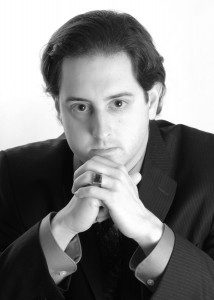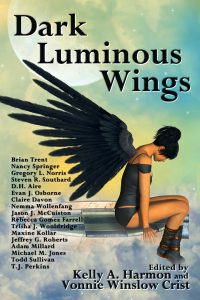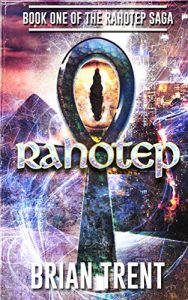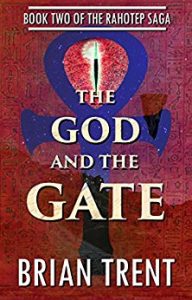Today I interview Brian Trent, author of a story appearing in the upcoming anthology Dark Luminous Wings.
 Brian is a science fiction writer with an interest in technology and society. His story “War Hero” was a winner in the Writers of the Future Contest. His work appears regularly in a wide array of publications, including Analog, Fantasy & Science Fiction, Cosmos, Nature, The Mammoth Book of Dieselpunk, Galaxy’s Edge, Escape Pod, Apex, Daily Science Fiction, and more. He also writes nonfiction, with work appearing in UTNE, The Humanist, Strange Horizons, Clarkesworld, and more. His works explore how human society, and indeed humanity itself, changes in the face of developing technology.
Brian is a science fiction writer with an interest in technology and society. His story “War Hero” was a winner in the Writers of the Future Contest. His work appears regularly in a wide array of publications, including Analog, Fantasy & Science Fiction, Cosmos, Nature, The Mammoth Book of Dieselpunk, Galaxy’s Edge, Escape Pod, Apex, Daily Science Fiction, and more. He also writes nonfiction, with work appearing in UTNE, The Humanist, Strange Horizons, Clarkesworld, and more. His works explore how human society, and indeed humanity itself, changes in the face of developing technology.
Now, the interview:
Poseidon’s Scribe: How did you get started writing fiction? What prompted you?
Brian Trent: Reading is what got me into writing. From a very young age, I cut my teeth on Ray Bradbury, Isaac Asimov, Ursula K. Le Guin, Arthur C. Clarke, but also on the Thousand-and-One Nights, Joseph Campbell, Edgar Rice Burroughs, and plenty of Doc Savage. I was instinctively attracted to stories of adventure, exploration, dark wanderings, and possible tomorrows. I wrote my first stories on large lined Legal pads that I’d buy by the dozen, then graduated to a Brother 11 typewriter, electronic typewriter, and computer. Who knows what we’ll be using in the future?
P.S.: Who are some of your influences? What are a few of your favorite books?
B.T.: H.G. Wells and Jules Verne had a huge impact on me, as did Poe, King, Clarke, Lovecraft, Bradbury. A friend of the family bought me an anthology of Golden Age science fiction stories, and that helped propel me fully into the genre. When I’m interested in something, I really dive in; I read sci-fi from the pulps of the 1920s through the then-nascent cyberpunk revolution. I also studied the lives of the authors I admired, until it felt like I knew them personally. If there had been a celebrity gossip column for literary figures, I’d probably have subscribed.
Favorite books are too many to list, but I would count Ender’s Game, The Jungle Books, Snow Crash, Neuromancer, and especially The Stars My Destination among them.
P.S.: What are the easiest, and the most difficult, aspects of writing for you?
B.T.: Beginning a story is always the hardest part for me. Facing the glacial whiteness of a blank page and trying to think of a good entry point into the tale is always a challenge. For that reason, I rarely open my drafts at the beginning. Rather, I jump right into a scene or dialog that might take place anywhere other than the start!
The easiest part? That’s tough to say, as it varies from story to story. I love crafting the plot, building layers and setting them into place like the gears of a clock. And I adore exploring characters through dialog; you know when you’re on the right track as a writer when the characters are in full conversations that seem to spring directly out of their heads.
P.S.: You’ve written a considerable number of nonfiction articles in addition to your many fictional stories. How difficult is it to shift between the two types of writing?
B.T.: I have a background in journalism, which can help polish your writing. Steven King made the same observation way back: it encourages you to write to the point, and to write lean. Most of my reading is nonfiction, too. I find it an easy switch between the two styles, probably because a lot of my published nonfiction is in the field of science and technology, and has appeared in science fiction magazines — I’ve published nonfiction pieces with Strange Horizons and Clarkesworld, for instance.
P.S.: What is it about the science fiction genre that draws you there?
B.T.: Science fiction is a wonderful journey into unknown country. There are well-worn trails, sure, but plenty of uncharted territory as well. What I love about science fiction is that its speculations are often based in the probable: the “science” part is an essential part of the definition and scope. While I enjoy fantasy and I write in that genre as well, I appreciate the rational extrapolations of sci-fi more than “magic is the answer.” I’d say that the genre also serves the dual purposes of lighting hopeful beacons into the future, as well as sounding the warning bells on that same journey. It’s one thing to wonder about the potential dangers of, say, genetically engineered viruses, but it’s more effective (visually and viscerally) when you can read a fictional story that examines those ramifications. Really, it comes back to Wells (the pessimist) and Verne (the optimist). And both approaches are needed.
 P.S.: Your story “Enchantment Lost” appears in the anthology Dark Luminous Wings. Please tell us about the story.
P.S.: Your story “Enchantment Lost” appears in the anthology Dark Luminous Wings. Please tell us about the story.
B.T.: “Enchantment Lost” is set in the far future, when a centuries-old woman hires a recovery specialist to undertake a rather unusual mission. As expressed by the story’s opening lines: “I need you to find my childhood. I know where it is. I’m hiring you to recover it, and return it to me.”
P.S.: What prompted you to write “Enchantment Lost?”
B.T.: I did a lot of ruminating on the anthology’s theme: Dark Luminous Wings. That can mean so many things. For me, the setting (which I won’t spoil) suggested itself immediately, as it exemplified all three words in the anthology’s title. When I set out to outline the tale, I built that theme into the aesthetics, the setting, and the underlying motivation of the characters. What does “flying” mean for us? It can be a destination or an escape, a nod to Icarus and also a promise of future travels. I ended up writing the story in a week, as things just clicked into place.
P.S.: Many of your science fiction stories contain historical references or are inspired by historical events and people. Why is that?
B.T.: I’m obsessed with history; I devour history books by the score. And I like to build my science fiction on the bones of history, as it springs off of known elements into tomorrow’s inventions, explorations, and developments. One lesson from history is that people don’t change: we are fundamentally no different from the people who lived in ancient Athens or Babylon or… well… the meltwater marshes of the Neolithic. The props change, the technology improves, political and cultural zeitgeists come in and out of fashion, but humanity remains the same. Even when we contemplate post-human futures (which is one of my favorite subjects) they still arise from an underlying human framework. In “Enchantment Lost,” the characters of Jack Saylor and Sylvia Tornquist are people who possess motivations we can understand, even if the world they live in is very different from ours.
I also love classical-era aesthetics. I dislike the monochromatic, sterile look of a lot of sci-fi, or conversely, the grimy patina on so much dystopia. I like color and vegetation infused with colonnades and vibrant agoras, while computers hum and glow in the background.
And lastly, I admire the zeitgeist of scientifically-minded eras like the Enlightenment, and the art-minded eras like the Italian Renaissance. I like to import both into my invented futures.
P.S.: In what way is your fiction different from that of other science fiction authors?
B.T.: I don’t know if it’s for me to say, really, but I do think my areas of interest (history, mythology, literature) infuses some different elements into my fiction. I do write across a wide array of genres and subgenres, from hard SF to steampunk, alternate history to space opera.
P.S.: The Published Works section of your website lists many, many published stories. Some are award or contest winners. What’s your secret for being so prolific?
B.T.: I habitually work on numerous stories at once, toggling from one to another so these batches tend to “grow up” together. And they’re usually very different from each other, so that I don’t burn out on one particular subject. If I’m working on a hard SF tale requiring lots of research and plotting, I like to balance that with a fantasy story, and balance that with a more action-oriented tale, with maybe a gothic horror story on the side. It keeps me on my toes, helps prevent stagnation, and it always keeps me writing: I don’t get bogged down in one story’s composition, because if progress is slowing for one project, I’ll alight onto another one and work there for a time. I guess my varied approach also matches my own interests: I don’t watch just one kind of film or read one kind of book. I’m interested in how things work, in the details of the universe I live in. Working on multiple projects comes naturally, as my daily imaginings, readings, and travels are all over the spectrum.
Another thing that aids this productivity is that roughly seventy-five percent of my stories are set in my “War Hero” universe. This universe is already a well-defined setting with its unique history, politics, and technology, so I don’t need to invent from scratch all those details any more: each new story in that timeline expands on the scaffolding that earlier stories have constructed. A lot of my stories will themselves suggest events that I’ll later explore. One recent example is in an upcoming novelette, where I make an offhand reference to a newspaper headline concerning an orbital heist. It has no bearing on the story other than serving as a local detail… but the story of that heist is told in my Galaxy’s Edge story “Breaking News Involving Space Pirates.”
P.S.: What is your current work in progress? Would you mind telling us a little about it?

 B.T.: I’m continuing to write books in my historical fantasy series RAHOTEP; each book explores another episode in the life of a four-thousand-year-old entity from ancient Egypt. And I have a science fiction novel being published next year. I can’t say too much at this time, but details on that and other pending work will be released on my website, www.briantrent.com.
B.T.: I’m continuing to write books in my historical fantasy series RAHOTEP; each book explores another episode in the life of a four-thousand-year-old entity from ancient Egypt. And I have a science fiction novel being published next year. I can’t say too much at this time, but details on that and other pending work will be released on my website, www.briantrent.com.
Poseidon’s Scribe: What advice can you offer aspiring writers?
Brian Trent: Polish your craft until it gleams. Open yourself up to learning from the greats in the field. Read, read, and read some more, seeing how others do it. And when you’ve done all that, strategize your approach to the industry. It isn’t enough to say “Never give up.” You need to look at the industry with a tactical eye. Never stop growing as a writer.
Thanks, Brian! Readers can get to know Brian better at his website and at his Facebook page.
Poseidon’s Scribe

Pingback: Great Silence | Brian Trent